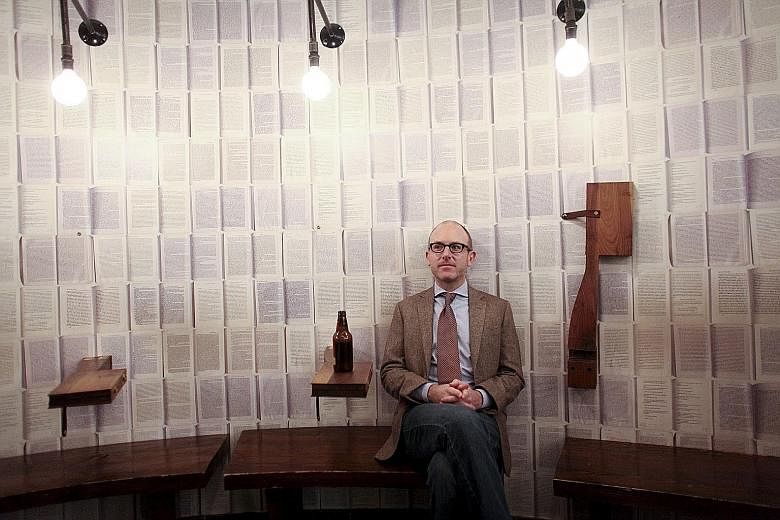NEW YORK • Lorin Stein, editor of The Paris Review, the prestigious magazine that for more than 60 years has acted as an international literary tastemaker, resigned on Wednesday, amid an internal investigation into his behaviour towards female employees and writers.
He sent a letter of resignation to the Paris Review board, in which he apologised for his behaviour and said he had decided he could not continue in the role.
"At times in the past, I blurred the personal and the professional in ways that were, I now recognise, disrespectful of my colleagues and our contributors, and that made them feel uncomfortable or demeaned," Stein, 44, wrote. "I am very sorry for any hurt I caused them."
The board of the magazine was set to meet yesterday to discuss its internal investigation, which began in October and was conducted by a sub-committee formed by the board, according to a person familiar with the internal investigation.
Members of the sub-committee, as well as lawyers from Debevoise & Plimpton, the publication's long-time counsel, spoke to current and former employees, and also received complaints from at least two female writers who said they had negative encounters with Stein. The board had yet to decide what action to take in the matter.
Earlier on Wednesday, Stein had sent an e-mail to the board expressing his remorse and suggesting any missteps would not happen again.
He acknowledged dating and expressing interest in women with whom he had professional connections, including interns and writers for the magazine, conduct that he acknowledged was "an abuse of my position".
He told the board he had occasionally engaged in sexual behaviour in the office after hours, but said that in all instances, the sexual contact was consensual and had happened when he was single. He married in 2015.
Still, he said he knew some of his behaviour had made his colleagues feel uncomfortable. "The way I behaved was hurtful, degrading and infuriating to a degree that I have only begun to understand this past month," he wrote.
His resignation will likely roil the literary world, where he is a widely respected figure, regarded by many as a champion of new talent, including some women writers, and celebrated as an editor whose critical eye has helped define and shape the landscape of contemporary American fiction.
Despite The Paris Review's relatively small circulation, it has an outsized influence in publishing. Founded in Paris in 1953 by George Plimpton, Peter Matthiessen and Harold L. Humes, the publication has catapulted the careers of writers such as Rick Moody, Jack Kerouac, Philip Roth and Adrienne Rich.
The board's decision to review Stein's behaviour came after he informed board members his name had appeared on a list created after the Harvey Weinstein scandal to anonymously crowdsource allegations of harassment and misconduct by men in publishing and media.
The magazine had been largely run day-to-day by Stein, but is also overseen by a board of literary and publishing elites, including its president Terry McDonell, a former top magazine editor, and novelist Jeffrey Eugenides.
The magazine's board released a statement on Wednesday that said it "is committed to whatever is necessary to ensure that The Paris Review is free from harassment and discrimination of any kind".
Stein also resigned on Wednesday from his position at Farrar, Straus and Giroux, where he was an editor-at-large, according to Mr Jeff Seroy, a senior vice-president for the publisher.
Stein became The Paris Review's editor in 2010, following Philip Gourevitch and Plimpton, who had led the magazine until his death in 2003.
Many said Stein breathed new, edgy life into the journal, increasing its print circulation dramatically and amplifying its online presence. Viewed by some as a throwback to the literary world's glamorous past of boozy lunches and charismatic editors, Stein, dapper and charming, projected an aura that made literature seem sexy and fun again.
For all its intellectual rigour, The Paris Review has been known to stage raucous parties and some women who worked there said it had a sexually charged office culture that Stein helped to cultivate.
Several people who worked at the magazine said he often complimented young women on their appearance and suggested they invite their attractive friends to the parties.
One of the women who complained to the Paris Review lawyers, a writer whose work Stein published in the review, told The Times he had initiated a sexual relationship with her a few years ago and had sex with her in the magazine's office, while he was her editor.
While she said the relationship was consensual, she said it had ended badly and, afterwards, when the magazine rejected three submissions she made, she thought the outcome was tied to the souring of their romance.
She requested anonymity because she said she feared professional repercussions.
Her literary agent confirmed that the writer had told her of the relationship with Stein in 2013.
NYTIMES

